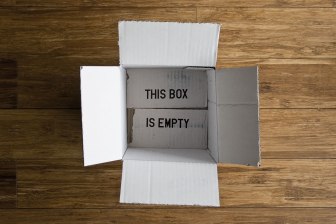
It is not clear to me that the universe exists. I’m not saying, of course, that there aren’t a lot of things in existence – my dog, this laptop, Saturn’s rings, and so on. And with any actual list of existent things, we can talk about the collection of those things, and give that collection any name we please. But when we try to talk about the collection of all things, it’s not obvious that we know what we are talking about, or even that such a collection exists. It certainly seems like the words make sense – “the collection of all things that have ever existed, or will ever exist” – but there is at least the possibility that these words, when strung together, don’t really refer to anything. Maybe such a collection is impossible.
We can talk about the collection of all shoes that have ever existed or will ever exist, or the collection of uncles, or the collection of neckties. We can also talk about collections of collections, being the clever creatures we are: the collection of collections that have four or less items, or the collection of collections which each contain at least one thing touched by Abraham Lincoln. But (employing here Bertie Russell’s old trick) what about the collection of all collections? Does that make sense? If it does, then it also seems we should be able to distinguish two smaller collections within it: the collection of collections which include themselves (the great list of all lists, which should include itself), and the collection of collections which do not include themselves (the great list of all things that are not lists, for example). But this second collection of collections turns out to be impossible: for if it were to exist, it would have to list itself if it didn’t list itself. So maybe this idea of a collection of all collections is only a string of words that initially seems to make sense, but on further reflection really doesn’t.
I might have lost you there with the collection of collections business, but the point is that the trick of grouping stuff together in our minds can lead us astray on occasion. And the universe may be just such an occasion. As Immanuel Kant would remind us, have we ever actually seen the universe? Or have we only seen parts of it? Can we even imagine experiencing the entire universe? If we can’t, then Kant is pretty sure it is not the sort of thing we can have any knowledge about. It is a hollow idea we form, and once we form it, we can prove anything we like about it – that it is finite, that it is infinite, that it had a beginning in time, that it didn’t, and so on.
If there isn’t a universe, I guess there would only be a pluraverse: a many-ness of many things. This accords with experience, as there sure seem to be many things. Notice how adopting such a natural view takes the drama out of the whole “multiverse” idea, or the claim that there are other possible universes. Well; if the universe doesn’t exist, then it doesn’t make much sense to wonder about the existence of other “universes,” does it?
What should we then say about the collection of things or events that haven’t been experienced, or (for all we know) will never be experienced? But again, are we sure that this collection makes sense? I can make great big lists of things that have been experienced, and of things that (so far as I know) have not been experienced, thus:
| Experienced things | Not-experienced things |
| John Lee Hooker performances
water freezing walking on the moon birthday parties long meetings (etc.) |
mountains transforming into mice
levitation talking giraffes coins flipping “heads” 700 times in a row hammers turning into strawberry jam (etc.) |
But I am not sure that these partial lists can be summed up into two fully-inclusive groups, the collection of all experienced things and the collection of all not-experienced things. Again, it may be that while surely there are experienced and not-experienced things, there don’t exist full collections of such things. Not because there is there is some problem in the “summing up” process, but because the words we throw out into the world, like a lasso, trying to catch a wild variety of beasts – those words unravel, like strands in a rope that just won’t cohere. The “(etc.)” at the end of my lists may be hiding an impossibility.
Because my mind (like most, I suspect) is so prone to make large groups and say things about them, I find it hard to describe what it’s like to think metaphysically in a pluraverse. It almost seems to me that in order to do it, one has to stop thinking metaphysically. (Once again, Kant said it first.) We can talk about what we experience, or specific things we don’t experience, and group them together only when we can formulate a simple and coherent procedure for determining whether a given things belongs in the group or does not. When the procedure includes checking uncountably-many things you can never experience, or could never possibly list, then that the procedure is no longer simple and coherent, and there’s a decent chance you are talking nonsense.
Leave a comment